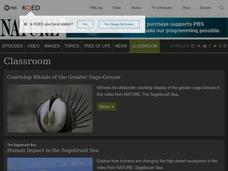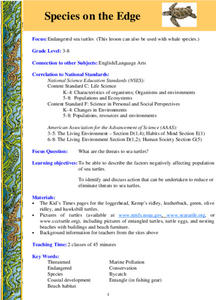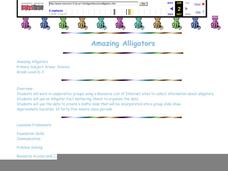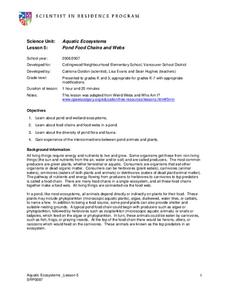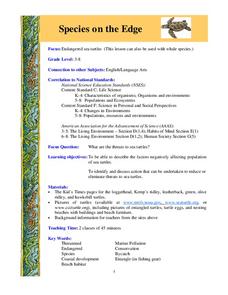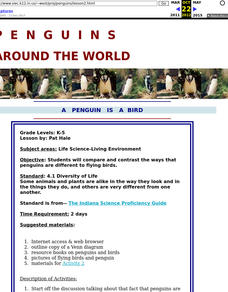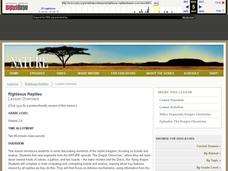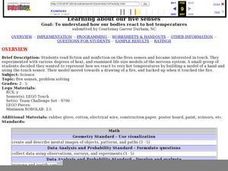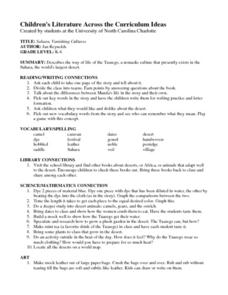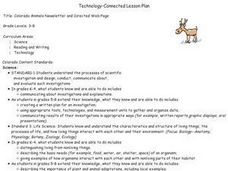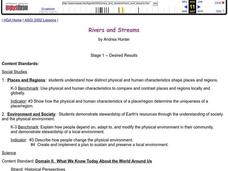Curated OER
Termitology
Learners engage in an inquiry-based study of the ecology of termites. Through hands-on investigations, they explore the life cycle of termites, the termite's role in the food web, and the unique social structure of termite colonies.
Curated OER
Pond Exploration
Pupils take a hands-on approach to explore the world beneath the water in this activity. They examine the creatures they catch to study about the adaptations these animals have that allow them to survive in this harsh environment. They...
Curated OER
Characteristics of Snakes and Turtles
Students examine the characteristics of snakes and turtles and compare/contrast reptiles with mammals. They watch a video, answer discussion questions, complete information charts, conduct Internet research, and create a habitat diorama.
Curated OER
Pet Detective WebQuest
Students take an online tour to learn about pets and their care. They click on selected Web links and answer questions about the material they encounter. They share something they learned from the WebQuest with a partner.
Curated OER
Species on the Edge
Learners describe factors negatively affecting population of sea turtles, and identify and discuss action that can be undertaken to reduce or eliminate threats to sea turtles and other endangered species.
Curated OER
Fred the Fish -- A River Ran Wild
Students apply cause and effect relationships to water pollution in a stream. In this pollution instructional activity students recognize the importance of clean water in their daily lives. Students accompany "Fred the Fish" as he...
Curated OER
Amazing Alligators
Students uncover facts about the alligator: including but not limited to habitat, characteristics, food, traits, habits, offspring and interesting facts.
Curated OER
Hide In Plain Sight
Students view video clips and use the Internet to look for hidden animals. They then use the Internet to print out animal shapes and color them. They create environments on construction paper in which their animals can hide.
Curated OER
How Does a Green Plant Grow?
Students of all ages can explore the question "how do seeds grow?", design an experiment to answer the question, predict the outcome of the experiment then conduct the experiment.
Curated OER
Aquatic Ecosystems
Students study ponds and wetland ecosystems and examine the food chains and webs in them. In this aquatic ecosystems lesson students answer questions about the diversity of the flora and fauna in a pond.
Curated OER
Species on the Edge
Learners examine sea turtles. In this endangered species lesson, students analyze sea turtle habitats. Learners hypothesize why sea turtles could go extinct.
Curated OER
A Penguin is a Bird
Students compare and contrast the ways that penguins are different to flying birds.
PBS
Righteous Reptiles
Young scientists write and draw about their knowledge of reptiles. They also view a nature video focusing on lizards and snakes, complete a chart comparing and contrasting them. Next, they focus on the defense mechanisms...
Curated OER
Bats, Bats, Everywhere!
Students research information on bats while working in cooperative groups. They design posters with the information from their research.
Curated OER
How Does a Green Plant Grow?
Students examine how a seed grows, and design an experiment to explore this concept. They make predictions, conduct the experiment, record the results, and interpret the results.
Curated OER
Learning About Our Five Senses
Young scholars study the sense of touch and various degrees of heat. They design a model that displays how the human hand reacts to heat using a touch sensor.
Curated OER
Children's Literature Across the Curriculum Ideas-Sahara, Vanishing Cultures
Students read Sahara, Vanishing Cultures by Jan Reynolds. They complete a variety of cross-curricular activities surrounding the study nomadic cultures. Included are reading, art, math, science, writing, social studies, and library...
Curated OER
What is a Pest?
Students investigate whether rabbits should be considered pests even though they make good pets. They extend this to determine what, when, and where other organisms are considered to be pests, and examine why the concept of a pest is a...
Curated OER
Soild Waste and Recycling
In this unit of lessons, students examine solid waste and recycling. They discover the concept of decomposition. They also observe the decomposition process and make observatins.
Curated OER
Habitat Is Home
Students are introduced to the concept and components of a habitat. They discuss the key components of a habitat and describe how certain factors can cause disturbances in a habitat and change its population. Activities are leveled for...
Curated OER
Graphic Organizer: Research Note Taking Made Easy
What do you wonder about bats? Use an open-ended question like this to engage your class and interest them in an upcoming research project. There's a list of example questions to offer or suggest regarding bats, but see what they can...
Curated OER
Colorado Animals Newsletter and Directed Web Page
Students select a Colorado animal, develop a Directed Web page, and research their animal. Each member of the group combine their research and develop a Newsletter.
Curated OER
Rivers and Streams
Students research the rivers, streams and water bodies of Hawaii. They read a variety of books, play Bingo with water-related terms, create and maintain water-themed journals, view videos, conduct Internet research and participate in a...
Curated OER
Illustrating Endangered Species
Young scholars conduct research to answer the questions for each section. They critique a work of art using the levels of art criticism. Also they prepare gathered facts for a final presentation.


